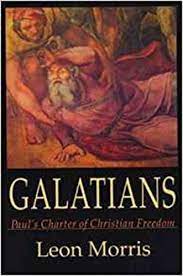
Among Paul's letters, Galatians burns like a firestorm of apostolic rebuke, persuasion and passion for the truth of the gospel. Against those who would preach 'another gospel', Paul deploys an arsenal of biblical-theological reasoning and rhetoric of contrasting images that have seldom sailed failed to arrest readers of every succeeding era.
Freedom in Christ is set against bondage to the law, adopted children of God are contrasted with slaves of elemental spirits, and justification by faith is opposed to works of the law. But what are these 'works of the law' good works by which people assert their self-achieved righteousness, or practices of the Jewish law that defined social boundaries and thus stood as a barrier to Gentiles from entering the new covenant?
Astute readers will recognize this question as central to the recent scholarly debate over the "new perspective" on Paul. Leon Morris clearly stands in the tradition of Martin Luther and the reformers. With seasoned insight and deft simplicity, he explores the complexities and bold affirmations of Galatians, laying bare its essential lines and message. Never diverted by interpretive fashion or speculation, he represents a classic exegetical tradition that focuses on the plain meaning of the biblical text and the apostolic truth of the gospel.
Readers who have puzzled over the twists, turns and compressed arguments of Galatians will be delighted to have Morris as their guide. The text that through the centuries has stirred and ignited the embers of gospel faith speaks with clarity again in our day.
Freedom in Christ is set against bondage to the law, adopted children of God are contrasted with slaves of elemental spirits, and justification by faith is opposed to works of the law. But what are these 'works of the law' good works by which people assert their self-achieved righteousness, or practices of the Jewish law that defined social boundaries and thus stood as a barrier to Gentiles from entering the new covenant?
Astute readers will recognize this question as central to the recent scholarly debate over the "new perspective" on Paul. Leon Morris clearly stands in the tradition of Martin Luther and the reformers. With seasoned insight and deft simplicity, he explores the complexities and bold affirmations of Galatians, laying bare its essential lines and message. Never diverted by interpretive fashion or speculation, he represents a classic exegetical tradition that focuses on the plain meaning of the biblical text and the apostolic truth of the gospel.
Readers who have puzzled over the twists, turns and compressed arguments of Galatians will be delighted to have Morris as their guide. The text that through the centuries has stirred and ignited the embers of gospel faith speaks with clarity again in our day.



